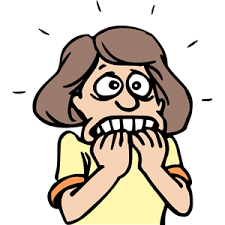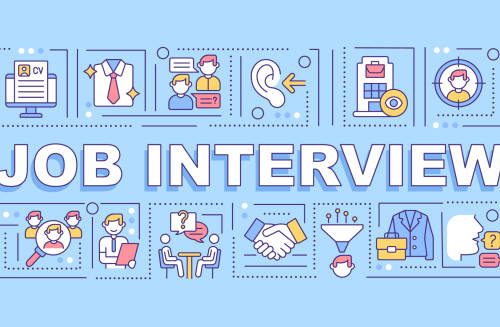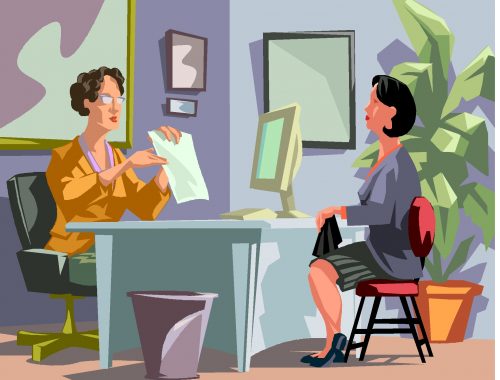Be Prepared!!
Interviews– even typing the word makes my stomach feel like it is flipping upside down. However, interviews are a part of life and most of us will have to do serval of them in our lifetime. “If someone is sufficiently impressed by your résumé to want to talk to you, the next step is one or more screening interviews, usually followed by an on-site interview”. (Morgan et al) sounds like a simple process, right? Well, this does not take into the amount of prep and practising that goes into an interview and does not consider how to deal with disappointment when an interview is not successful, which unfortunately happens often.
The simulated interviews were our chance to gain some experience into what it is like to be interviewed when applying for a job in the broadcasting industry. For reflecting on my interview experience I will be using Gibb’s Reflective Cycle (see Fig. 1). The cycle covers six stages: description, feelings, evaluation, analysis, conclusion, and action plan. I will be looking into these different stages and applying them to my interview process.

The interviews were peer assessed which I thought was a great idea as it offered me the chance to learn from my peers and by interviewing each other it allowed me to pick up on different interviewing techniques. We sat the tables and chairs up in an interviewing format with two on one side being the interviewers and another person on the opposite side being the interviewee, we rotated around after each interview, then we would review each other after the interviewee by giving written feedback.
My Inner Thoughts and Feelings

Beforehand I was an absolute ball of nerves. According to Rezek, “Anxiety can take many forms – it may be a specific phobia, such as of heights or small spaces, a fear of social embarrassment or humiliation, a general feeling of unease or nervousness, or a feeling of panic and being overwhelmed” (15), I had that feeling of ‘unease and nervousness’ prior to the interview as we were standing out in the corridor waiting to be called in. It was the sort of feeling you have before you go to perform on stage or the morning of your driving test. My palms were sweaty and my breathing was heavy, my legs were shaking and my heart was pounding that fast I was certain the others around me could hear it really to explode out of my chest. In all honesty I just wanted the ground to open and swallow me whole so I could get out of it. However, as soon as I got into the room and sat down on the chair the fear left my body and the adrenaline took over.
“Anxiety can take many forms – it may be a specific phobia, such as of heights or small spaces, a fear of social embarrassment or humiliation, a general feeling of unease or nervousness, or a feeling of panic and being overwhelmed”
– Cheryl Rezek
Was It Really That Bad?
The simulated interviews were great for giving me experience of what it is like when going for interviews in the real world. My only experience of an interview has been my part time job which is in retail, so the difference between that and an interview for a job in the broadcasting industry is like night and day. It can be an intimating atmosphere but what I learnt from my experience it is just like a formal conversation and the more you act like yourself the more confident you will feel during the interview. I feel the worst part of the experience was trying to find a job in the first place, with a degree like broadcast production, we can try our hand at different areas in the industry such as: presenting, camera, audio, lightning, producing. Therefore, my biggest struggle was trying to find my niche and narrow done the type of job I would want to apply for once I have graduated with my degree.
Practice Makes Perfect
My biggest takeaway from the whole experience has been learning how important practise is for interviews. “Practise helps you gradually improve; it is the essence of true growth” (https://youtu.be/nTpDO3a3Zek ) without practise we cannot figure out our weaknesses and strengths.
My biggest strengths were my use of body language and eye contact, whereas my weakness was my short responses and not having my answers developed enough; if was not for these practise interviews I would not have been aware of this. Therefore, if I could do anything differently it would be to set aside a free day before a big interview to really plan out what I am going to say, as well as do plenty of research on the company I am applying for which will help to develop my answers.
What I took away from the experience was realising I need to figure what I want to be doing once I graduate and what time of jobs I want to be applying for. Once I take on the notes my peers have left me, I know I will be confident enough to walk into a real life interviewing scenario and be assured in the fact that I have tried my best – I just need to find the dream job first!

References
“Does Practise Really Make Perfect.” Uploaded by Anamol Ojaswi Singh. https://youtu.be/nTpDO3a3Zek Accessed 21st February 2023.
Mongan , John, Eric Giguere and Noah Kindler. ‘The Job Application Process’. Programming Interviews Exposed: Secrets to Landing Your Next Job, 3rd Edition. Wrox, 2012.
Rezek, Cheryl. ‘Anxiety, Depression and Mindfulness’. Anxiety and Depression. SPCK, 2106. Pp 15-20.
You May Also Like

BE A S.T.A.R 🌟
14 February 2023
To Be Or Not To Be – That Is The Interview Question
23 February 2023

One Comment
Nadine McBrien
https://blogs.qub.ac.uk/ael3001-2022/2023/02/21/be-prepared/